What is Observation?
Observation is the act of carefully watching and noting details about objects, events, or phenomena through our senses.
Types of Observation
There are two main types of observation: qualitative and quantitative.
- Qualitative observation: This type of observation involves descriptions that do not involve measurements. For example, describing the color, shape, or texture of an object.
- Quantitative observation: This type of observation involves measurements and numbers. For example, measuring the length, weight, or temperature of an object.
Why is Observation Important?
Observation is important in science because it helps us gather data and make sense of the world. It allows us to make predictions and form hypotheses based on the information we gather.
Improving Observation Skills
Observation skills can be improved through practice and by paying attention to details. Using tools such as magnifying glasses, microscopes, and thermometers can also enhance our ability to make detailed observations.
Study Guide for Observation
Here are some questions to help you study observation:
- What is observation in science?
- What are the two main types of observation?
- Give an example of a qualitative observation.
- Give an example of a quantitative observation.
- Why is observation important in science?
- How can you improve your observation skills?
[Observation] Related Worksheets and Study Guides:
.◂Science Worksheets and Study Guides First Grade. Animal groups
Study Guide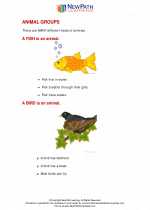 Animal groups
Animal groups  Worksheet/Answer key
Worksheet/Answer key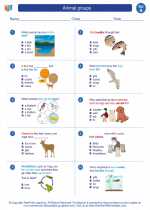 Animal groups
Animal groups  Worksheet/Answer key
Worksheet/Answer key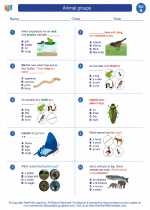 Animal groups
Animal groups  Worksheet/Answer key
Worksheet/Answer key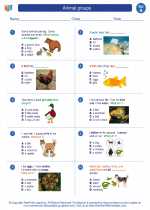 Animal groups
Animal groups  Vocabulary/Answer key
Vocabulary/Answer key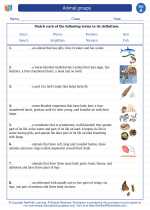 Animal groups
Animal groups 

 Worksheet/Answer key
Worksheet/Answer key
 Worksheet/Answer key
Worksheet/Answer key
 Worksheet/Answer key
Worksheet/Answer key
 Vocabulary/Answer key
Vocabulary/Answer key

The resources above cover the following skills:
LIFE SCIENCE
From Molecules to Organisms: Structures and Processes
Design a solution to a human problem by using materials to imitate how plants and/or animals use their external parts to help them survive, grow, and meet their needs (e.g., outerwear imitating animal furs for insulation, gear mimicking tree bark or shells for protection).